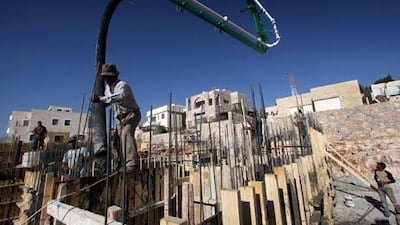TEL AVIV // Two senior Israeli cabinet ministers warned yesterday that failure to renew the settlement construction freeze would strengthen the Palestinians and jeopardise Israel.
The blunt comments by Ehud Barak, the defence minister, and Dan Meridor, the deputy prime minister, were compounded by a warning from a senior Israeli intelligence official that the Palestinian leadership could fall apart without significant progress towards peace with Israel.
The official told the BBC that Mahmoud Abbas, the Palestinian president, may become so discouraged with the deadlocked peace process that he steps down, prompting chaos within the Palestinian government.
The United States has offered Israel inducements to extend the West Bank moratorium for another 90 days so that direct talks with the Palestinians can resume.
Benjamin Netanyahu, Israel's prime minister, is expected to present the offer to his 15-member security cabinet this week. Two right-wing cabinet members have said they will abstain from voting, giving Mr Netanyahu a narrow majority if he chooses to push through a renewed settlement freeze.
The statements from the ministers and from the intelligence official appeared to be part of an orchestrated bid to counter campaigning by right-wing politicians and Jewish settler groups against any further limitation of settlement construction.
Mr Netanyahu briefed his full cabinet on Sunday on the US proposal, under which Israel would renew a 10-month partial moratorium for another three months. In return, it would obtain a multibillion-dollar package of incentives from Washington, including 20 fighter jets and a US commitment to block any Palestinian attempts in the United Nations to unilaterally declare a sovereign Palestinian state.
The deal could help to re-launch direct talks with the Palestinians, which began again in September but were suspended shortly afterwards when the Israeli settlement restrictions expired. Palestinians have refused to resume the peace process unless the curbs were renewed.
Mr Barak said yesterday that an Israeli rejection of the US proposal may result in the Palestinians gaining the upper hand in the peace negotiations.
"There are two options," Mr Barak, leader of the centrist Labour party, said. "Either we reach understandings with the Americans to find a way to force the Palestinians to sit around the negotiating table, or the Palestinians and the Arab world will reach an understanding with the Americans and it will be us eating frogs."
Mr Barak described the incentives on offer as "a very serious achievement for the prime minister". He said the 20 jets - valued at $3 billion (Dh11bn) - would help Israel to reach its aim of adding a total of 40 warplanes to its air force.
Mr Meridor, considered the most left-leaning among government ministers from Mr Netanyahu's Likud party, called the American offer "reasonable" and said resuming negotiations was more important to Israel's interest than extending the freeze.
"Israel's interests make it imperative to approve the freeze," he said. "The freeze is not the main thing - the negotiations are. Israel has an interest in creating a border, with Israel on the one side and the Palestinian state on the other."
In a possible indication of another incentive, a US diplomat said Israel would be allowed to finish the building of hundreds of homes in the West Bank even if it institutes the three-month freeze. The previous moratorium, which ended on September 26, did not apply to the 3,000 apartments now being built.
The plan's chances of passing the security cabinet increased when Eli Yishai, the head of the ultra-Orthodox Shas party, said he and the other Shas official in the cabinet would abstain from the vote if the proposal allowed unrestricted building to continue in East Jerusalem during the three-month period, and everywhere in the West Bank once the freeze expires.
The Palestinians have reacted angrily to the US plan agreeing to construction in East Jerusalem.
Palestinian officials have said they have not yet received the official US proposal.
Yesterday, Saeb Erekat, the veteran Palestinian negotiator, said Mr Netanyahu held the key to the resumption of the direct talks. The US president Barack Obama "knows very well that Netanyahu is responsible for stopping the negotiations," he said. "He also knows very well that Netanyahu has the key to the negotiations, and that he has closed the door to negotiations and chosen settlements, not peace."
The US secretary of state Hillary Clinton said yesterday that Mr Netanyahu was making a "serious effort" by considering a new freeze. "This is a very promising development and a serious effort by Prime Minister Netanyahu," Mrs Clinton said.
foreign.desk@thenational.ae
